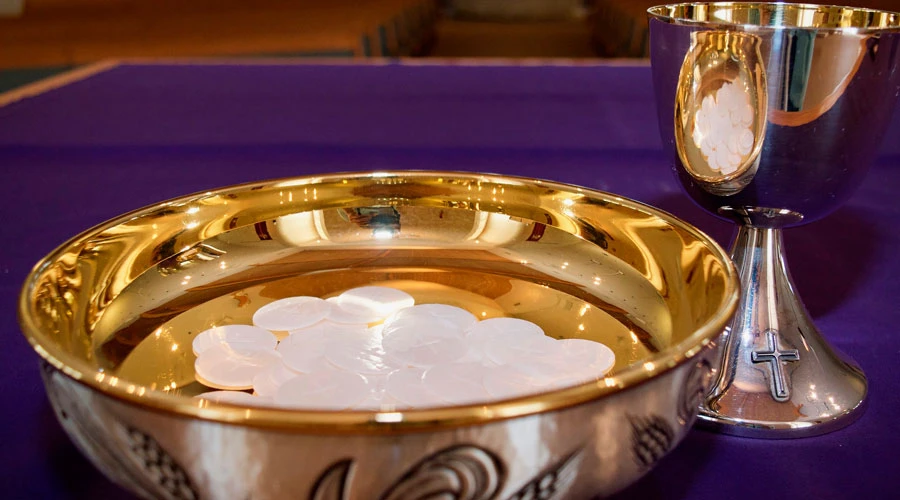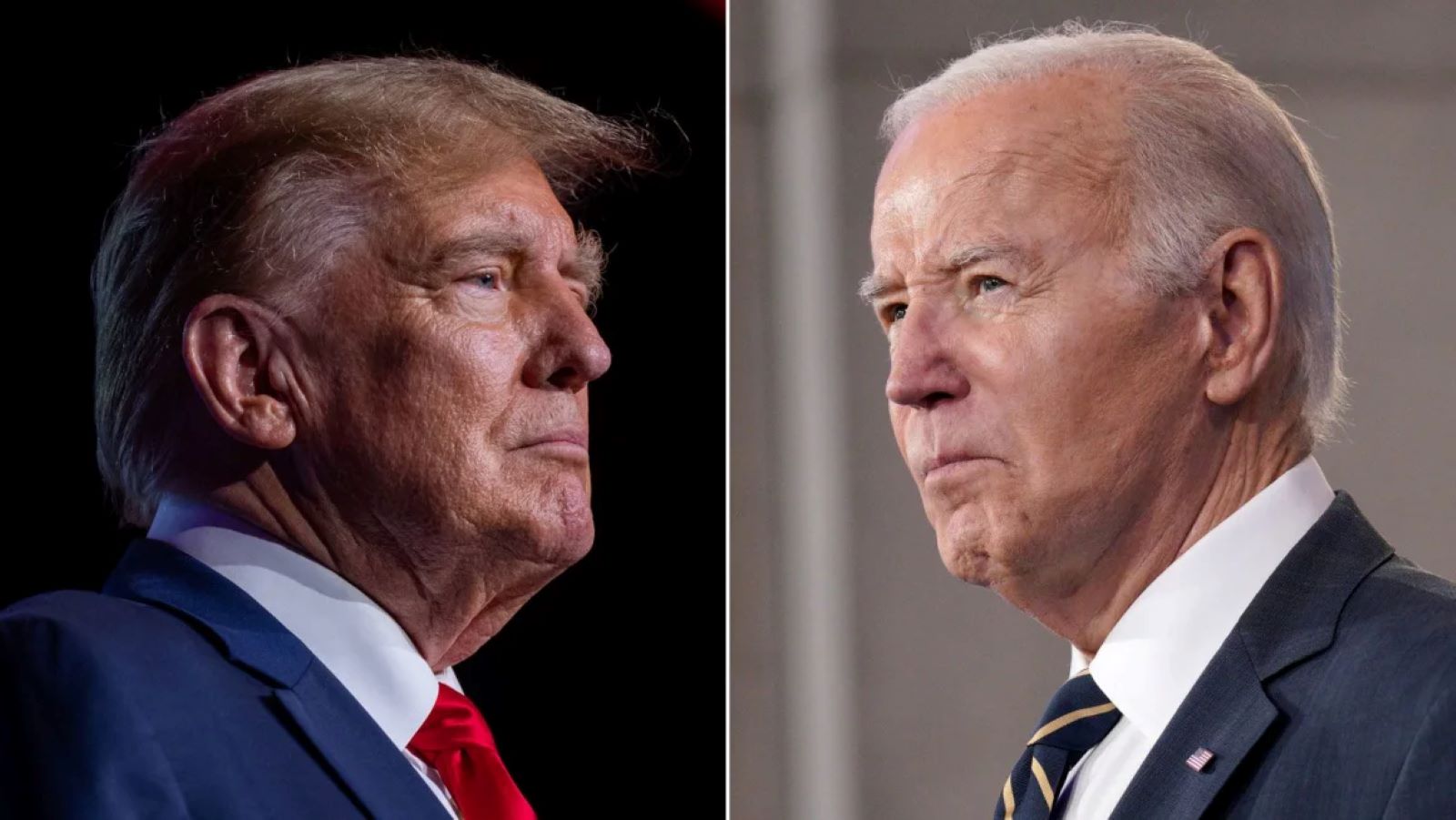The Vatican sends a message to the bishops of the United States about the Eucharist and Catholics in politics

The Governor of the Congregation for the Doctrine of the Faith (CDF), Cardinal Luis Ladaria, sent a letter to the President of the United States Congress of Catholic Bishops (USCCB), Bishop José Gómez, regarding acceptance into the Eucharist, highlighting the centrality of the 2002 prayer memo on the participation of Catholics in politics and the importance of Preserve the rights of bishops in their local churches.
The 2004 text by Cardinal Joseph Ratzinger, Then ruler of the congregation, “must be discussed only in the context of the doctrinal memorandum and its authority,” as Cardinal Ladaria’s letter refers to Bishop Gomez of May 7 and obtained by the English Language Agency of the ACI Group.
Archbishop Gomez, also Archbishop of Los Angeles, wrote to congregants in March to inform that United States bishops are analyzing the situation of Catholics in public office who support lenient legislation regarding abortion, euthanasia and other moral evils.
At the beginning of his response, Cardinal Ladaria highlighted that the letter that Cardinal Ratzinger sent in 2004 to Cardinal Theodore McCarrick on the same subject, “had the form of private communication with the bishops” and therefore, “since these principles have not been published by the conference, it is possible. To act as a help in preparing a draft of your document. “
Cardinal Ladaria said in his letter that Cardinal Ratzinger, now Pope Emeritus Benedict XVI, “offered general principles about the dignity of receiving the Eucharist to help local bishops in the United States deal with Catholics. Pro-choice (Abortion) in their jurisdiction. Cardinal Ratzinger’s connection should then be discussed only in the context of doctrinal observation and authority, which provides the teaching of magisterium on the theological basis of any initiative concerning the question of dignity to receive Holy Communion. “
Cardinal Ladaria confirmed that the doctrinal memorandum on some issues related to the participation of Catholics in political life was discussed during the visits. Ad Lemena Bishops in 2004, where “it was clear that there was no agreement on the issue of communion among the bishops” and that “the development of a national policy” was not under consideration.
The Spanish Cardinal indicated that this issue appeared again in the visits Ad Lemena For the years 2019 and 2020, and that the congregation “advised that a dialogue be conducted between the bishops to preserve the unity of the Episcopal Conference in the face of differences on this controversial issue. It was suggested to formulate a national policy in these visits.” Ad Lemena Only if this would help the bishops to preserve the unity. “
“This community asserts that such a policy, due to its potentially contentious nature, can have the opposite effect and become a source of contention rather than unity within the Episcopate and the wider Church in the United States. Ad Lemena The effective development of a policy in this area requires a two-stage dialogue: first between the bishops themselves, and then between the bishops and Catholics. Pro-choice In their jurisdiction. “
Cardinal Ladaria also said that the Episcopal Dialogue will help the bishops “to agree as a conference in support of legislation.” Pro-choice Does not conform to Catholic teachings. “
“Bishops must, therefore, discuss and reach agreements regarding the teaching of the above-mentioned doctrinal memorandum, which affirms in Article 3 that“ Christians are called to reject the concept of pluralism, as harmful to democratic life, because it reflects moral relativism and accepts that democracy should be based on A true and solid foundation of non-negotiable moral principles that refer to life in society. Bishops should affirm as a conference that “those who directly participate in the creation of legislative bodies have a clear and serious obligation to oppose any law that attacks human life,” wrote the congregation governor.
After doing so, local bishops could “go out and start conversations with Catholic politicians in their jurisdictions who are in office.” Pro-choice Regarding legislation on abortion, euthanasia or other moral evils, as a means of understanding the nature of their positions and their understanding of Catholic teachings, Cardinal Ladaria noted.
After these two “phases of a long and quiet dialogue”, the USCC will be able to “meet the difficult task of discerning the best way, from now on for the Church in the United States, to bear witness to the grave moral responsibility of government officials. Catholics to protect life in all its stages.”
“If it is subsequently decided to formulate a national policy on corporate dignity, such a statement will need to express a real consensus of the bishops on this issue, taking into account the precondition that any provision of the conference in this area respects the rights of the ordinary individual (the bishops) in Their dioceses and the privileges of the Holy See. “
The Cardinal added, “Any statement issued by the conference regarding Catholic political leaders would be better framed in the broad context of the dignity of receiving the Eucharist by all believers, rather than just one category of Catholics, thus reflecting their presence. The commitment to adapt their lives to the entire Gospel of Jesus Christ.” While preparing to receive the sacrament. “
The Vatican Authority also said that “it would be confusing for such a statement to give the impression that abortion and euthanasia are the only serious issues in Catholic morals and social teachings that require the highest level of responsibility on the part of Catholics.”
Cardinal Ladaria encouraged “every effort” to “dialogue with other Episcopal Conferences” and thus “to preserve unity” in the universal Church.
Bishop Gomez sent Cardinal Ladaria’s letter to each of the bishops of the United States on May 8, as requested. The Archbishop stressed that the Vatican Governor “provided us with an important context and a useful perspective for us in our continuous prayers and distinctions in this regard.”
Cardinal Ratzinger’s 2004 memo to the bishops of the United States indicates that a Catholic politician who “constantly promotes and votes for laws permitting abortion and euthanasia” is engaged in “public” and “official” cooperation in sin.
When this is the case, the pastor of the politician must “meet with him, guide him to the teachings of the Church, inform him that he cannot present himself to Holy Communion until his objective condition of sin has ended, and warn him that he will be deprived. Otherwise. Holy Eucharist,” Cardinal Ratzinger wrote afterwards, Adding that if a Catholic persists in grave sin and continues to present himself to Holy Communion, “the Communion servant must refuse to give him to him.
The 2004 memo was an application of Canon 915 of the Code of Canon Law, The rule governing the worldwide Church, which states that “Catholics who” obstinately insist on the grave and manifest sin should not be accepted into Holy Communion. “
In recent months local bishops in the United States have been teaching about the importance of dignity in receiving Communion.
In March, Bishop Thomas Babroke, Bishop of Springfield, Illinois, told the Regional Conference of the Canon Law Society of America that Catholics who publicly and stubbornly advocate abortion, including politicians, should be denied communion.
“I mean your outward actions.” The bishop said at the time, “If they live in a manner or occupy positions that are inconsistent with the teachings of the Church, the servant of communion must deprive them of the sacrament.”
In April, Bishop Thomas Olmsted, Bishop of Phoenix, published Apostolic Exhortation With a bendOn the mystery of the Eucharist, where he affirms that “Holy Communion is reserved for those who, by the grace of God, make a sincere effort to live this union with Christ and his Church, committed to everything that the Catholic Church believes and declares as declared by God.”
This is why the Church “requires Catholic leaders who have publicly supported dangerous immoral laws such as abortion and euthanasia not to receive the Eucharist until they publicly repent and receive the sacrament of penance,” wrote the Bishop of Phoenix.
Bishop Samuel Aquila, Archbishop of Denver, wrote in a column on Eucharistic coherence on April 14, that “the Eucharist is a gift, not a right, and the sanctity of this gift is only diminished by its unworthy reception.”
“Given the public scandal generated, this is especially true in the case of public officials who rule persistently in violation of natural law, in particular the outstanding cases of abortion, euthanasia, and the elimination of innocent lives, as well as other measures that do not defend the teaching of the Church regarding the dignity of life.” , Confirmed.
The Archbishop of San Francisco, Monsignor Salvatore Cordillion, stressed in a pastoral letter dated May 1 that any Catholic who formally cooperates with abortion must abstain from receiving Eucharist.
During his sermon at the Mass for Life vigil in January, Archbishop of Kansas City, Archbishop Joseph Naumann, said that Catholics should not receive communion if they conflict with the Church’s “fundamental” teachings.
The Bishop of San Diego, Monsignor Robert McIlroy, recently wrote an article for the Jesuit Review USA He pointed out that the refusal of aborted politicians in Holy Communion politicized the Eucharist, while Cardinal Blas Cubitch, Archbishop of Chicago, disagreed with the Archbishop of Denver’s column on the coherence of the Eucharist.
In October 2019, while campaigning for the presidency, Joe Biden was banned from congregating in the diocese of Charleston.
Charleston Archdiocese policy, which also applies to the Archdiocese of Atlanta and the Diocese of Charlotte, states that “Catholic public officials who continually support abortion on demand cooperate with evil in a public way.”
“By supporting the legislation in favor of abortion, they are then participating in an apparent and grave sin, a condition that excludes them from acceptance of Holy Communion as long as they persist in their pro-abortion stance,” adds the text of the canonical rule for the aforementioned eparchies.
Translated and adapted by Walter Sanchez Silva. Originally posted on CNA

“Bacon advocate. Certified creator. Twitteraholic. Tv junkie. Beer fanatic. Internet nerd. Passionate thinker. Reader.”




:quality(85)/cloudfront-us-east-1.images.arcpublishing.com/infobae/OF4NJDPGLBEYJAZ5XZMH3OIPJ4.jpg)



